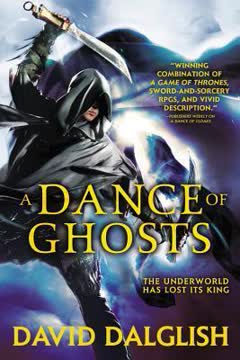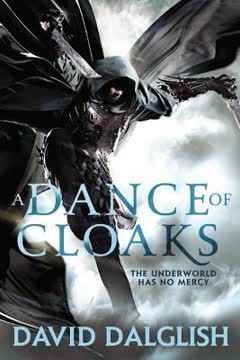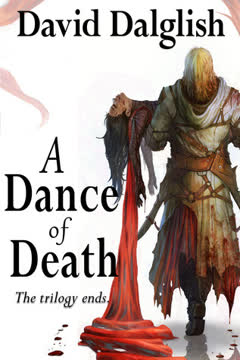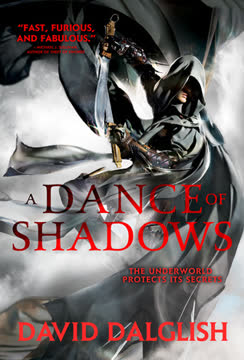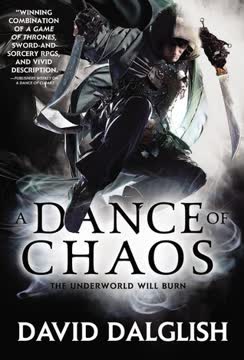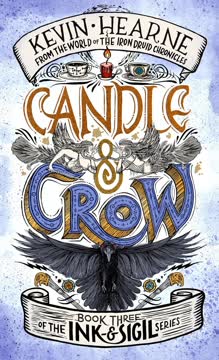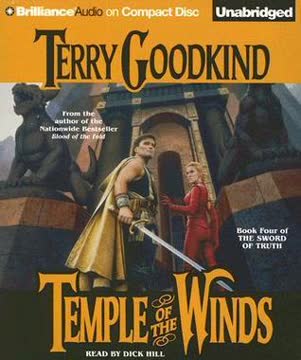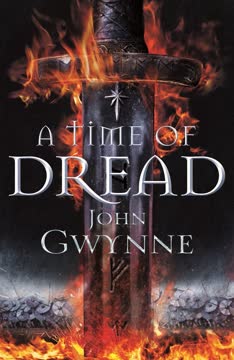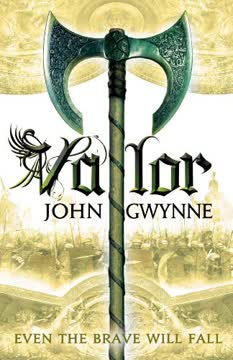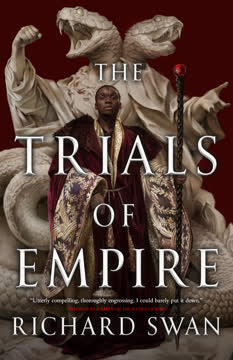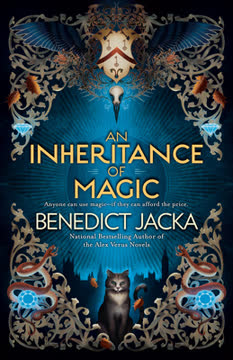Plot Summary
Shadows and Smoke
Veldaren is a city of shadows, where thief guilds rule the night and the people cower behind locked doors. Into this world steps Muzien the Darkhand, an elven guildmaster whose reputation for ruthlessness precedes him. He arrives with a singular purpose: to claim Veldaren for the Sun Guild, sweeping aside all rivals. His first act is to burn the Hawk Guild alive, sending a message of terror. The city's underworld trembles, but Muzien's ambitions are met with both awe and dread. Yet, in the darkness, old powers stir—Thren Felhorn, the legendary Spider Guildmaster, and his estranged son Haern, the Watcher, each with their own burdens and destinies. The city holds its breath, waiting to see who will rule when the smoke clears.
The Darkhand Arrives
Muzien's arrival is not subtle. He offers the guilds a choice: join the Sun or be destroyed. When the Hawks refuse, he unleashes fire and death, demonstrating his supernatural prowess and the loyalty of his followers. His methods are both brutal and efficient, using fear as a weapon to subdue the city. Meanwhile, Thren and Haern, father and son, travel together, their relationship fraught with tension and unspoken history. As they witness the Sun Guild's expansion, they realize the threat Muzien poses is unlike any before. The city's balance of power is shattered, and the rules of survival are rewritten.
Blood and Betrayal
The city's elite—Alyssa Gemcroft, Lord Victor Kane, and the mercenary Eschaton—struggle to adapt as the Sun Guild's influence spreads. Alyssa, blinded and beset by enemies, must decide whom to trust, while Victor's crusade against the underworld falters. Betrayals abound: Melody Gemcroft, Alyssa's mother, manipulates from the shadows, freeing a deadly assassin known as Ghost to eliminate her rivals. The lines between friend and foe blur, and the cost of loyalty grows ever steeper. In the city's underbelly, the seeds of rebellion and vengeance are sown, promising a harvest of blood.
Father and Son Blades
Thren and Haern's journey is as much internal as external. Haunted by their past, they confront the nature of power, mercy, and destiny. Thren, the master killer, seeks to mold Haern into his heir, while Haern resists, clinging to a fragile sense of justice. Their travels bring them into conflict with orcish raiders and the Sun Guild's agents, forcing them to fight side by side. Yet, every victory is tainted by the knowledge that their paths may soon diverge—one toward redemption, the other toward ruin. The city's fate is mirrored in their fractured bond.
The Ghost Returns
Ghost, once thought dead, is freed from years of torture and emerges a changed man—scarred, addicted to violence, and bound by a curse. Melody tasks him with assassinating her enemies, but Ghost's journey is one of self-destruction and desperate longing for absolution. He seeks out old allies and enemies, including the priest Calan and the mercenary Bill, trying to reclaim his strength and purpose. His encounters with Zusa, Alyssa's protector, and the Eschaton mercenaries are fraught with violence and regret. Ghost's presence is a harbinger of chaos, his fate entwined with the city's own.
Daughters of the Lion
In the shadows of the city, the faceless women of Karak's order are both victims and instruments of religious zeal. Melody's machinations draw on the power of the Lion, manipulating prophecy and blood to secure her claim. Young girls are inducted into the faceless, their identities erased in the name of purity. Zusa, once one of them, now stands apart—her loyalty to Alyssa and her own sense of self warring with the scars of her past. The temple's rituals and the priests' ambitions threaten to unleash forces beyond their control, as prophecy and sacrifice intertwine.
The Sun Rises
With the rival guilds crushed or cowed, Muzien stages a public massacre in the marketplace, killing one in ten to enforce his rule. The city's elite are forced to choose: submit and pay tribute, or face annihilation. Alyssa, Victor, and the remnants of the Trifect must navigate a new order where coin and fear are the only currencies. The Watcher's truce is shattered, and the city's hope dims. Yet, beneath the surface, resistance stirs—old alliances are reforged, and the seeds of rebellion are sown in blood.
Chains and Choices
Haern is captured and tortured in the Stronghold, the fortress of Karak's dark paladins. There, he faces Carden, a sadistic enforcer who seeks to break his will. Haern's faith and endurance are tested to their limits, as he clings to the memory of those he loves. Meanwhile, Thren must choose between his own ambitions and the fate of his son. The Stronghold's secrets are revealed through pain and sacrifice, and the cost of freedom is measured in blood. The choices made within its walls will echo throughout the city.
The Price of Mercy
Delysia, the priestess of Ashhur, is forced to confront the limits of her compassion. When Ghost, dying and desperate for absolution, seeks her forgiveness, she must decide whether mercy can redeem a monster. Haern, driven by vengeance, cannot let go of the past, and his actions threaten to destroy the fragile bonds that hold him to those he loves. The cost of mercy is high, and the wounds it leaves may never heal. In the end, forgiveness is both a gift and a curse, shaping destinies in ways none can foresee.
The Stronghold's Secrets
At the heart of the Stronghold, the imprisoned priest Luther reveals a terrible secret to Thren: the Sun Guild's stone tiles are part of a ritual that could destroy Veldaren to prevent a greater evil. The prophet Velixar, Karak's chosen, seeks to open a gateway to other worlds, threatening annihilation. Luther entrusts Thren with the key to the ritual, forcing him to choose between saving the city or damning it to save the world. The weight of prophecy and the burden of choice fall heavy on all who learn the truth.
Fire in the Marketplace
Muzien's massacre in the marketplace cements his rule through terror. The people of Veldaren, cowed and broken, submit to his demands. Victor and Tarlak, powerless to stop the slaughter, are forced to reconsider their strategies. The city's spirit is crushed, and hope seems lost. Yet, in the aftermath, the survivors begin to plot, seeking allies and searching for the means to resist. The fire that burns in the marketplace is both a warning and a promise—the city will never be the same.
The Fall of the Wolf
Cynric and the Wolf Guild make a desperate bid to resist the Sun, launching a bloody ambush against Muzien's forces. Their courage is met with overwhelming power, as Muzien himself slaughters the last of the Wolves. The era of the old guilds ends in blood and fire, and the city's underworld is remade in Muzien's image. Yet, the defiance of the Wolves is not forgotten, and their sacrifice becomes a rallying cry for those who would resist tyranny.
Prisoners and Prophets
Nathaniel, Alyssa's son, is plagued by prophetic visions of fire and destruction. Melody, driven by her own faith and ambition, manipulates prophecy to secure her power. The priests of Karak, divided by heresy and tradition, struggle to interpret the signs. The fate of the city—and perhaps the world—rests on the choices of a few, as gods and mortals alike play their parts in a drama of destiny. The line between savior and destroyer blurs, and the future is written in blood.
The Faceless and the Faithful
Zusa, cast out and betrayed, confronts the horrors of her past as she discovers new victims of the faceless order. In a moment of rage and sorrow, she kills Daverik, the priest who perpetuated the cycle, and frees the girls in his care. Stripping away her wrappings, Zusa rejects the identity forced upon her, choosing her own path. Her act of defiance is both a personal liberation and a blow against the system that created her. The struggle for identity and agency is fought in the shadows, but its impact is profound.
The Breaking of Bonds
Haern and Delysia's relationship is tested to the breaking point as the consequences of their choices come due. Haern's need for vengeance against Ghost leads to a final, tragic confrontation, shattering the trust between him and Delysia. Zusa, too, is forced to choose between love and loyalty, as Alyssa's marriage to Victor threatens to sever their bond. The ties that bind are strained and broken, leaving all adrift in a city ruled by fear and ambition.
The Watcher's Crossroads
Haern returns to Veldaren to find the city changed and his place within it uncertain. The Watcher's truce is gone, the guilds are shattered, and the people live in terror. Haunted by his actions and the loss of Delysia's trust, Haern questions his own identity and purpose. In a moment of vulnerability, he finds solace with Zusa, both seeking comfort in a world that offers little. The crossroads before him are fraught with peril, and the path he chooses will shape the city's fate.
Ashes or Empire
Thren returns to Veldaren, determined to reclaim his legacy. Rejected by Muzien, he is left with a terrible choice: use Luther's medallion to destroy the city and deny it to the Sun, or find another way to seize power. The weight of history and ambition presses upon him, and the scars of his past drive him toward a decision that could doom them all. The city stands on the brink, its future balanced between ashes and empire.
The Lion's Roar
As the priests of Karak seek guidance, a vision of fire and destruction overwhelms the temple. Nathaniel, caught in the throes of prophecy, is told he alone can save the city—if he listens and obeys. The gods' games reach their climax, and the fate of Veldaren hangs by a thread. In the shadows, heroes and villains alike prepare for the final reckoning, their choices echoing the roar of the Lion and the promise of chaos to come.
Characters
Haern (The Watcher)
Haern is the son of Thren Felhorn, raised to be a perfect killer but yearning for something more. As the Watcher, he is both feared and revered, a symbol of justice in a city of shadows. His relationship with his father is fraught with pain, regret, and a desperate need for approval or escape. Haern's journey is one of self-discovery, as he struggles to reconcile his violent skills with his desire for mercy and redemption. His love for Delysia and his friendship with the Eschaton mercenaries anchor him, but his inability to forgive or let go of vengeance threatens to consume him. Haern's arc is a meditation on the cost of violence, the possibility of change, and the search for identity in a world that demands blood.
Thren Felhorn
Thren is the legendary leader of the Spider Guild, a man whose name inspires fear and respect. Cold, calculating, and ruthless, he is driven by ambition and a belief in the natural order of strength over weakness. His relationship with Haern is complex—he both loves and resents his son, seeing in him both a failed heir and a reflection of his own lost humanity. Thren's actions are shaped by a deep sense of betrayal and loss, particularly the death of his wife Marion. As the city slips from his grasp, Thren is forced to confront the limits of his power and the emptiness of his legacy. His choices—whether to destroy the city or reclaim it—are the culmination of a lifetime spent in the shadows, and his psychological depth is revealed in moments of vulnerability and rage.
Muzien the Darkhand
Muzien is an elven guildmaster whose arrival in Veldaren signals a new era of terror. He is both a master strategist and a supernatural force, wielding fear as his greatest weapon. Muzien's motivations are rooted in a desire for control, order, and the creation of an empire that will outlast him. His methods are brutal but efficient, and he inspires both loyalty and terror in his followers. Muzien's psychological complexity lies in his rejection of his own people and gods, choosing instead to embrace the worst aspects of humanity. He is both a mirror and a challenge to the city's heroes, forcing them to confront the nature of power and the cost of resistance.
Delysia Eschaton
Delysia is a priestess of Ashhur and a founding member of the Eschaton Mercenaries. Her gentle nature and healing powers are contrasted by the violence that surrounds her. Delysia's love for Haern is both a source of strength and pain, as his need for vengeance and her commitment to mercy come into conflict. Her journey is one of forgiveness, both for others and herself, as she struggles to find a place in a world that punishes compassion. Delysia's psychological depth is revealed in her moments of doubt, her willingness to forgive even the unforgivable, and her ultimate decision to step away from Haern when his darkness threatens to consume them both.
Ghost (Lawrence)
Once a feared killer, Ghost is reborn after years of torture, scarred in body and soul. Bound by a magical curse to kill or die, he is driven by a desperate need for forgiveness and meaning. Ghost's encounters with Delysia, Zusa, and the Eschaton mercenaries force him to confront the consequences of his actions and the possibility of redemption. His psychological journey is one of self-loathing, addiction to violence, and a final, tragic search for peace. Ghost's death at Haern's hands is both a release and a condemnation, a testament to the difficulty of escaping one's past.
Alyssa Gemcroft
Alyssa is the head of the Gemcroft family, a woman of strength and vulnerability. Blinded by betrayal, she must navigate a world of shifting alliances and constant danger. Her relationships—with her son Nathaniel, her lover Zusa, and her suitor Victor—are fraught with tension and longing. Alyssa's psychological complexity lies in her struggle to balance love, power, and survival. Her decisions shape the fate of her family and the city, and her willingness to sacrifice for Nathaniel's future is both her greatest strength and her deepest wound.
Zusa
Once a faceless assassin of Karak, Zusa is now Alyssa's protector and lover. Her journey is one of breaking free from the chains of faith and abuse, seeking identity and agency in a world that would define her by her scars. Zusa's loyalty to Alyssa is tested by betrayal and the demands of power, and her acts of violence are both a means of survival and a rebellion against her past. Her psychological depth is revealed in her moments of vulnerability, her need for love, and her ultimate decision to choose her own path, even if it means walking alone.
Victor Kane
Victor is a man driven by a vision of a better Veldaren, but his methods grow increasingly ruthless as his crusade falters. His relationship with Alyssa is both political and personal, and his willingness to compromise for power reveals the dangers of idealism unchecked by empathy. Victor's psychological arc is one of disillusionment, as he confronts the limits of his influence and the cost of his dreams. His alliance with Alyssa is both a hope for the future and a potential source of tragedy.
Melody Gemcroft
Melody is Alyssa's mother, a survivor of abuse and imprisonment who wields prophecy and faith as weapons. Her actions—freeing Ghost, manipulating the faceless, and seeking power through blood—are driven by a complex mix of love, ambition, and trauma. Melody's psychological depth is revealed in her moments of vulnerability, her longing for Luther, and her willingness to sacrifice everything for her vision of order. Her death is both a culmination of her schemes and a warning of the dangers of unchecked faith.
Nathaniel Gemcroft
Nathaniel is Alyssa's young son, gifted (or cursed) with visions of the city's destruction. His innocence is contrasted by the weight of destiny placed upon him by gods and mortals alike. Nathaniel's psychological journey is one of confusion, fear, and a desperate need for guidance. His role as a potential savior or destroyer is a reflection of the city's own precarious fate, and his choices may determine the future of all.
Plot Devices
Duality of Power and Mercy
The narrative is structured around the tension between power and mercy, embodied in the relationships between fathers and sons, lovers and enemies. Haern and Thren's dynamic is a microcosm of the city's own struggle—can violence ever lead to peace, or does it only beget more blood? Delysia's forgiveness of Ghost, and Haern's refusal to let go of vengeance, are mirrored in the city's cycles of betrayal and rebellion. The plot uses parallel arcs, mirrored confrontations, and repeated motifs (such as the medallion, the hood, and the stone tiles) to explore these themes.
Prophecy and Foreshadowing
Prophecy is woven throughout the narrative, from Nathaniel's visions to the priests' rituals and Melody's manipulations. The stone tiles, scattered across the city, are both a literal and symbolic ticking time bomb, their true purpose revealed only at the climax. Foreshadowing is used to build tension—Haern's fear of becoming his father, the repeated warnings about the cost of mercy, and the ever-present threat of the prophet Velixar. The narrative structure alternates between intimate character moments and sweeping events, using shifting perspectives to build a sense of inevitability and doom.
Cycles of Betrayal and Redemption
The story is built on cycles—of violence, betrayal, and the search for redemption. Characters are forced to confront the consequences of their actions, often repeating the mistakes of the past. The breaking of these cycles—Zusa rejecting the faceless, Delysia forgiving Ghost, Haern choosing not to kill his father—are moments of hope, even as the city spirals toward chaos. The use of parallel plotlines and mirrored character arcs reinforces the theme that change is possible, but never easy.
The City as Living Entity
The city itself is a central plot device, its streets, walls, and hidden places reflecting the struggles of its inhabitants. The shifting control of the guilds, the placement of the stone tiles, and the public spectacles of violence all serve to make Veldaren a living, breathing entity. The city's fate is tied to the choices of its people, and its destruction or salvation is both literal and symbolic.
Analysis
is a meditation on the cost of power, the possibility of redemption, and the struggle to break free from cycles of violence and abuse. Through its complex characters and interwoven plotlines, the novel explores the tension between mercy and vengeance, faith and doubt, love and ambition. The city of Veldaren serves as both setting and symbol—a place where the shadows of the past threaten to consume the future, and where every act of violence leaves a scar. The novel's use of prophecy and foreshadowing creates a sense of inevitability, yet the characters' choices—however flawed—offer moments of hope and transformation. The story warns of the dangers of unchecked ambition, the seduction of power, and the ease with which ideals can be corrupted. Yet, it also affirms the value of compassion, the strength found in forgiveness, and the enduring human desire for meaning and connection. In the end, A Dance of Ghosts
is both a tragedy and a call to resist the darkness within and without, to choose, even in the face of despair, the possibility of something better.
Last updated:
Review Summary
A Dance of Ghosts receives mostly positive reviews, with an average rating of 4.16 out of 5. Readers praise the character development, world-building, and action-packed plot. Many consider it a strong entry in the series, setting up for an exciting finale. Some criticize it as a transitional book with slower pacing. The complex relationships and political intrigue are highlighted as strengths. A few readers express disappointment with certain character arcs and plot points. Overall, fans of the series eagerly anticipate the conclusion.
